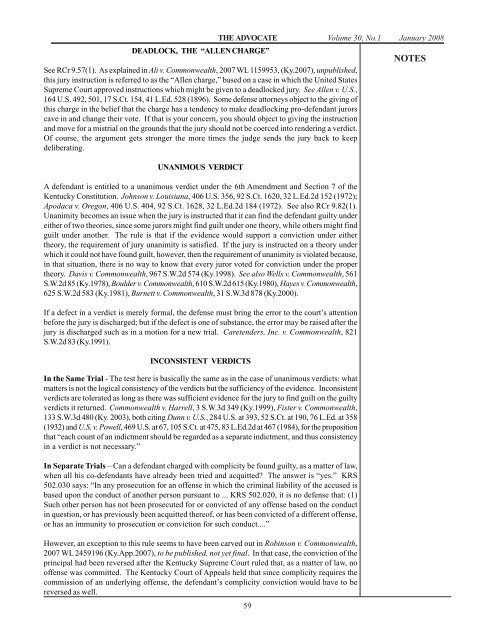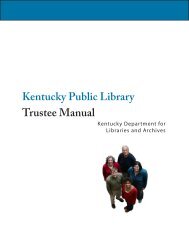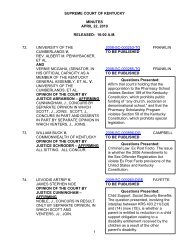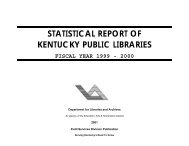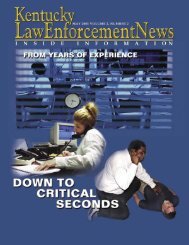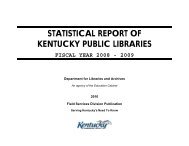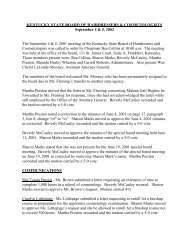Jan08 Advo.pmd - e-archives Home
Jan08 Advo.pmd - e-archives Home
Jan08 Advo.pmd - e-archives Home
Create successful ePaper yourself
Turn your PDF publications into a flip-book with our unique Google optimized e-Paper software.
DEADLOCK, THE “ALLEN CHARGE”<br />
THE ADVOCATE Volume 30, No.1 January 2008<br />
See RCr 9.57(1). As explained in Ali v. Commonwealth, 2007 WL 1159953, (Ky.2007), unpublished,<br />
this jury instruction is referred to as the “Allen charge,” based on a case in which the United States<br />
Supreme Court approved instructions which might be given to a deadlocked jury. See Allen v. U.S.,<br />
164 U.S. 492, 501, 17 S.Ct. 154, 41 L.Ed. 528 (1896). Some defense attorneys object to the giving of<br />
this charge in the belief that the charge has a tendency to make deadlocking pro-defendant jurors<br />
cave in and change their vote. If that is your concern, you should object to giving the instruction<br />
and move for a mistrial on the grounds that the jury should not be coerced into rendering a verdict.<br />
Of course, the argument gets stronger the more times the judge sends the jury back to keep<br />
deliberating.<br />
UNANIMOUS VERDICT<br />
A defendant is entitled to a unanimous verdict under the 6th Amendment and Section 7 of the<br />
Kentucky Constitution. Johnson v. Louisiana, 406 U.S. 356, 92 S.Ct. 1620, 32 L.Ed.2d 152 (1972);<br />
Apodaca v. Oregon, 406 U.S. 404, 92 S.Ct. 1628, 32 L.Ed.2d 184 (1972). See also RCr 9.82(1).<br />
Unanimity becomes an issue when the jury is instructed that it can find the defendant guilty under<br />
either of two theories, since some jurors might find guilt under one theory, while others might find<br />
guilt under another. The rule is that if the evidence would support a conviction under either<br />
theory, the requirement of jury unanimity is satisfied. If the jury is instructed on a theory under<br />
which it could not have found guilt, however, then the requirement of unanimity is violated because,<br />
in that situation, there is no way to know that every juror voted for conviction under the proper<br />
theory. Davis v. Commonwealth, 967 S.W.2d 574 (Ky.1998). See also Wells v. Commonwealth, 561<br />
S.W.2d 85 (Ky.1978), Boulder v. Commonwealth, 610 S.W.2d 615 (Ky.1980), Hayes v. Commonwealth,<br />
625 S.W.2d 583 (Ky.1981), Burnett v. Commonwealth, 31 S.W.3d 878 (Ky.2000).<br />
If a defect in a verdict is merely formal, the defense must bring the error to the court’s attention<br />
before the jury is discharged; but if the defect is one of substance, the error may be raised after the<br />
jury is discharged such as in a motion for a new trial. Caretenders, Inc. v. Commonwealth, 821<br />
S.W.2d 83 (Ky.1991).<br />
INCONSISTENT VERDICTS<br />
In the Same Trial - The test here is basically the same as in the case of unanimous verdicts: what<br />
matters is not the logical consistency of the verdicts but the sufficiency of the evidence. Inconsistent<br />
verdicts are tolerated as long as there was sufficient evidence for the jury to find guilt on the guilty<br />
verdicts it returned. Commonwealth v. Harrell, 3 S.W.3d 349 (Ky.1999), Fister v. Commonwealth,<br />
133 S.W.3d 480 (Ky. 2003), both citing Dunn v. U.S., 284 U.S. at 393, 52 S.Ct. at 190, 76 L.Ed. at 358<br />
(1932) and U.S. v. Powell, 469 U.S. at 67, 105 S.Ct. at 475, 83 L.Ed.2d at 467 (1984), for the proposition<br />
that “each count of an indictment should be regarded as a separate indictment, and thus consistency<br />
in a verdict is not necessary.”<br />
In Separate Trials – Can a defendant charged with complicity be found guilty, as a matter of law,<br />
when all his co-defendants have already been tried and acquitted? The answer is “yes.” KRS<br />
502.030 says: “In any prosecution for an offense in which the criminal liability of the accused is<br />
based upon the conduct of another person pursuant to ... KRS 502.020, it is no defense that: (1)<br />
Such other person has not been prosecuted for or convicted of any offense based on the conduct<br />
in question, or has previously been acquitted thereof, or has been convicted of a different offense,<br />
or has an immunity to prosecution or conviction for such conduct....”<br />
However, an exception to this rule seems to have been carved out in Robinson v. Commonwealth,<br />
2007 WL 2459196 (Ky.App.2007), to be published, not yet final. In that case, the conviction of the<br />
principal had been reversed after the Kentucky Supreme Court ruled that, as a matter of law, no<br />
offense was committed. The Kentucky Court of Appeals held that since complicity requires the<br />
commission of an underlying offense, the defendant’s complicity conviction would have to be<br />
reversed as well.<br />
59<br />
NOTES


